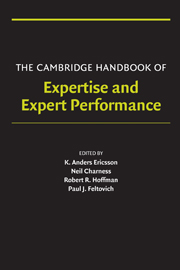Book contents
- Frontmatter
- Contents
- Acknowledgments
- Contributors
- PART I INTRODUCTION AND PERSPECTIVE
- PART II OVERVIEW OF APPROACHES TO THE STUDY OF EXPERTISE – BRIEF HISTORICAL ACCOUNTS OF THEORIES AND METHODS
- PART III METHODS FOR STUDYING THE STRUCTURE OF EXPERTISE
- PART IV METHODS FOR STUDYING THE ACQUISITION AND MAINTENANCE OF EXPERTISE
- PART V DOMAINS OF EXPERTISE
- PART VI GENERALIZABLE MECHANISMS MEDIATING EXPERTISE AND GENERAL ISSUES
- Author Index
- Subject Index
- References
30 - Expertise in Chess
from PART V.C - GAMES AND OTHER TYPES OF EXPERTISE
- Frontmatter
- Contents
- Acknowledgments
- Contributors
- PART I INTRODUCTION AND PERSPECTIVE
- PART II OVERVIEW OF APPROACHES TO THE STUDY OF EXPERTISE – BRIEF HISTORICAL ACCOUNTS OF THEORIES AND METHODS
- PART III METHODS FOR STUDYING THE STRUCTURE OF EXPERTISE
- PART IV METHODS FOR STUDYING THE ACQUISITION AND MAINTENANCE OF EXPERTISE
- PART V DOMAINS OF EXPERTISE
- PART VI GENERALIZABLE MECHANISMS MEDIATING EXPERTISE AND GENERAL ISSUES
- Author Index
- Subject Index
- References
Summary
Historical Background
Just like Drosophila – the fruit fly – is a model organism in genetics, chess has long served as a model task environment (similar to how is a model in genetics Drosophila – fruit fly) for research into psychological processes (Charness, 1992). Some of the earliest systematic work on individual differences in imagery (Binet, 1893/1966; 1894), memory (Djakow, Petrowski, & Rudik, 1927), and problem solving (de Groot 1946/1965) took place in the domain of chess. Cleveland (1907) was one of the first to identify the importance of complex units, now called chunks, in skilled play and speculated that intellectual abilities might be poor predictors of chess skill, even providing the score of a game played with a “mentally feeble” individual.
De Groot (1946/1965) ushered in the modern era of investigation using small groups of expert and grandmaster-level players in experimental studies. Of de Groot's many findings, it was the dissociation between thinking skills and perceptual-memory skills that laid the groundwork for subsequent research. When asking players to think aloud while they attempted to choose the best move in an unfamiliar position, de Groot discovered that, contrary to popular lore, the most-proficient players did not think further ahead than less-skilled practitioners. It was a different experimental task – memory for briefly presented chess positions – that markedly differentiated skill levels. De Groot found that skilled players proved to have strikingly superior memory for chess positions after brief presentations (two to fifteen seconds), compared to their less-proficient counterparts.
Information
- Type
- Chapter
- Information
- The Cambridge Handbook of Expertise and Expert Performance , pp. 523 - 538Publisher: Cambridge University PressPrint publication year: 2006
References
Accessibility standard: Unknown
Why this information is here
This section outlines the accessibility features of this content - including support for screen readers, full keyboard navigation and high-contrast display options. This may not be relevant for you.Accessibility Information
- 41
- Cited by
